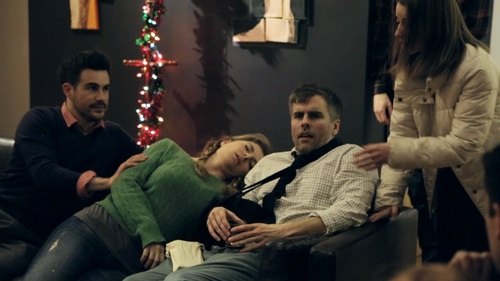This is Radically Intimate Theatre
Home > TDF Stages > This is Radically Intimate Theatre

The Representatives are an underground theatre sensation
—
This week The Representatives — the most beloved theatre troupe you may not have heard of — stage their newest show, Of Orient Are. If you’re in the mood for hyper-intimate, socially relevant comedy, leap into action; they only play through the weekend. But if you’re busy ’til Monday, don’t worry: the Representatives produce a brand-new, custom-written play every three months. Representatives’ shows are like buses — miss one and another will be along in a moment.
The Representatives are like buses in another way, too: they show you the city. The company’s signature pieces are so-called “apartment plays,” micro-productions that turn everyday sidewalks into de facto theatre lobbies. Bewildered audiences mill about on the street corner, frantically checking phones, since there’s no marquee, no poster… no sign at all that you’ve reached your destination. Only those with tickets (obtained via the mailing list at therepresentatives.org) receive the address, which must be kept confidential. Admission is a bottle of wine. And once you’ve seen a show this way, you’ll never see an anonymous New York street quite the same way again.
The company is primarily a collaboration between actor Matt Steiner and playwright Stan Richardson, fast becoming known as frontline purveyors of the newest version of “radically intimate” theatre. Along with their “apartment plays,” their work can include special on-demand commissions for fans and provocative political pieces made site-specifically. Some of their company’s burgeoning glamor is undoubtedly due to their pop-up locations, but there’s also something deeper happening: an interdependent rapport struck up between the theatremakers and their audience. All the communications are personal — not mass — emails (“Yo Helen!,” said a recent message to this reporter), and admission also comes with a heartfelt invitation to the post-show party. You have to bring a bottle of wine, but they will cheerfully pour it right back into you.
The pair met in 2006 when Steiner auditioned for Richardson at Dixon Place — the Lower East Side venue then housed, coincidentally, in an apartment. For the actor and playwright, “It was love at first sight,” says Steiner. The actor’s energetic, satyrish style jibed with Richardson’s rapid-fire dialogue: “I find I have to do less work with Stan’s plays,” he says. For Richardson it was finally hearing the words as he had imagined them. “My mentor is Edward Albee, who always steered us towards precision with language. Matt got that immediately.” Certainly Richardson’s writing can remind you of Albee in his Who’s Afraid of Virginia Woolf? mode, with impossible quantities of verbiage packed densely into tight spaces.
The Representatives like to develop work on its feet, so these performances allow both participation in their frenetic process and a sort of voyeuristic frisson. The pieces aren’t quite workshops, aren’t quite productions, yet they are completely considered entertainments, full of frantic invention and a deep investment in community. And for anyone disheartened by the social disengagement of our current downtown scene, take heart: audience members, unscientifically sampled during a rollicking after-party, credit the team’s political convictions as one of the things that keeps them coming back. Richardson builds his works around hot-button issues to further that sense of intimacy: “We reach out to the audience, we bind them to us,” says the playwright.
This hyperlocal social sense can lead to something rather uncomfortable as well. “Frankly, the audiences are mostly liberal, mostly progressive. There’s no need for morality tales; we need hypocrisy tales.” Adds Steiner, “It turns the magnifying glass on our own little group.”
Richardson always ties at least one recent, significant event into his works —The Rakes: An Introduction included a campus shooting; Incredible Things, Awful Things dealt with Wikileaks; and this spring’s The Rakes Progress included a tutor who has an affair with a student.
Of Orient Are
performs at the Cave, the underground space in St. George’s Church in Gramercy Park. While it isn’t in an apartment, Stein promises it will still put actors right in the audience’s laps. As always, they got the space through a fan, who walked up after a show and said, “Hey, we have this space you have to use…” Richardson always writes for the spaces they work in, so their usual apartment venues tend to drive him toward realistic, domestic dramas. Here he finds himself reaching beyond realism. Three actors play twelve characters, and the basement space — often used for twelve-step programs and other talk-it-out groups — is based around the age-old structures of storytelling.
Explains Steiner, “This particular church was one of the first churches where Alcoholics Anonymous started having meetings. It’s not so much the fact that it’s a church that is evocative to us, but that it’s a place where people meet.” In Of Orient Are, three 20-something liberal activists are charged with escorting three aging cultural icons to the orientation of a Midwestern college, a place that is trying to revamp its image by admitting a radically diverse freshman class. According to Steiner, at least two of the three icons are recognizable amalgamations of activist Elders from the worlds of civil rights, sexual liberation, and the AIDS battle. The play’s framing device wraps the audience into the story: the activists have invited the crowd to a secret meeting.
Says Steiner, “Our stuff is always a representation of what interests and terrifies us, but this time it’s almost more intense. We’ve been really examining the question, ‘Just who do we represent?’ In this play, there’s a lot about race, and we’re two white guys! So we’ve been asking, ‘What do people in our position do? What opinions can we have? The icons we respect today because of the paths they’ve carved out — are their methods still viable now?'” This show only runs through September 21st, but Steiner and Richardson hope to take it on the road. “We wanted a trunk show,” Steiner says, laughing. “But we don’t even need a trunk.”
Then there are the hybrid projects they’re working on with Joshua Paul Johnson (whose documentary on Richardson’s Flooded With Light is a great introduction to their apartment-play style): a true crime series filmed in front of an audience and a My Dinner with Andre-esque travelogue starring two characters called Matt and Stan. “This, ultimately, is what we represent,” says Steiner. “This blurring of the line between art and fiction — whether it’s through proximity, the parties we throw, the way we hear from the audience all the time.” And can they possibly keep to such a breakneck schedule? Richardson shrugs. “If I keep writing, I don’t get stuck.”
—
Helen Shaw is a writer based in New York City
Top photo (from The Rakes Progress) by Joshua Paul Johnson
